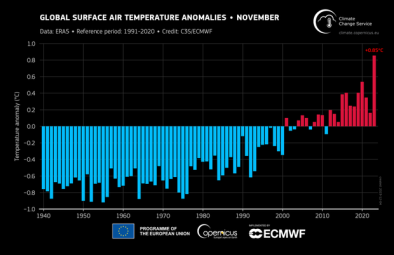UN Report Finds Global Temperature Increase Getting Closer To 1.5C
Planet Earth will likely experience a significant global warming milestone in the coming years, according to the World Meteorological Organization (WMO). The WMO — The United Nations’ weather agency — says there’s a 2 in 3 chance that before 2027, the planet will register a year in which the global air temperature will be 1.5°C or more above pre-industrial levels, temporarily. This is due to a combination of global warming and natural variability, according to the WMO, as the oceans give up heat to the atmosphere during El Niño, which occurs naturally and is not part of anthropogenic warming. Following the El Niño event, average global temperatures are expected to head back down (temporarily) before ratcheting back up again as global warming marches on — unless and until net carbon pollution go down to zero. Importantly, the impacts associated with such a one-year event are not the same as the impacts associated with an average long-term rise of 1.5°C, the threshold that the Paris Climate Agreement guards against (a point of some confusion). “This report does not mean that we will permanently exceed the 1.5°C level specified in the Paris Agreement, which refers to long-term warming over many years. However, WMO is sounding the alarm that we will breach the 1.5 C level on a temporary basis with increasing frequency,” WMO Secretary-General Petteri Taalas said in a statement. “We don’t expect the longer-term average to pass 1.5°C until the early-to-mid 2030s,” climate scientist Zeke Hausfather added in an email to the AP. The 2015 Paris climate accord, signed by close to 200 countries, set a goal of limiting average global warming to no more than 2 degrees Celsius and preferably no more than 1.5 degrees.
(AP, CNN, CBS News, Fox Weather, Scientific American, Gizmodo, BBC, Guardian, USA Today, Fast Company, New York Times $, Wall Street Journal $, Washington Post $, Economist $)
To receive climate stories like this in your inbox daily click here to sign up for the Hot News Newsletter from Climate Nexus:
Related Content






